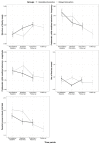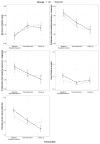Changes in Eating Behaviors Following Taste Education Intervention: Focusing on Children with and without Neurodevelopmental Disorders and Their Families: A Randomized Controlled Trial
- PMID: 36235654
- PMCID: PMC9571701
- DOI: 10.3390/nu14194000
Changes in Eating Behaviors Following Taste Education Intervention: Focusing on Children with and without Neurodevelopmental Disorders and Their Families: A Randomized Controlled Trial
Abstract
Fussy-eating children often display problematic behaviors around mealtimes, such as irritation, opposition, or may even throw tantrums. This may lead to reduced food variety and poor nutritional profiles, which may increase parents' worries about their children's diet, particularly when the children also have neurodevelopmental disorders (ND) such as Autism Spectrum Disorder (ASD) and Attention-Deficit/Hyperactive Disorder (ADHD). To investigate the effect of Taste Education on problematic mealtime behaviors, 81 children aged 8-12 years, with ND (n = 33) and without (n = 48), and their parents, participated in a 7-week Taste Education intervention. Children were matched on age, sex, and ND, and allocated at random into Immediate-intervention and Delayed-intervention groups. Parents completed the Meals in Our Household Questionnaire (MiOH). To examine changes in MiOH-scores, repeated-measures analysis-of-variance with time-points were used, with condition as factors (Immediate intervention and Delayed intervention). Baseline measures were adjusted for, and a robust linear mixed-model was fitted. Results showed superior outcomes for Intervention compared to waiting on all measures of MiOH, with stable effects through six-month follow-up. Differences were non-significant between children with and without ND. The Taste Education program suggests a promising, simple, and non-intrusive way to reduce children's problematic mealtime behaviors in the long term.
Keywords: ADHD; autism spectrum disorder; eating behaviors; fussy-eating; neurodevelopmental disorders; parents-child dyads; problematic mealtime behaviors.
Conflict of interest statement
The authors declare no conflict of interest. The funders had no role in the design of the study; in the collection, analyses, or interpretation of data; in the writing of the manuscript; or in the decision to publish the results.
Figures




Similar articles
-
Taste education - A food-based intervention in a school setting, focusing on children with and without neurodevelopmental disorders and their families. A randomized controlled trial.Appetite. 2021 Dec 1;167:105623. doi: 10.1016/j.appet.2021.105623. Epub 2021 Aug 8. Appetite. 2021. PMID: 34371121 Clinical Trial.
-
Body Composition in Fussy-Eating Children, with and without Neurodevelopmental Disorders, and Their Parents, Following a Taste Education Intervention.Nutrients. 2023 Jun 18;15(12):2788. doi: 10.3390/nu15122788. Nutrients. 2023. PMID: 37375692 Free PMC article.
-
Fussy Eating among Children and Their Parents: Associations in Parent-Child Dyads, in a Sample of Children with and without Neurodevelopmental Disorders.Nutrients. 2021 Jun 25;13(7):2196. doi: 10.3390/nu13072196. Nutrients. 2021. PMID: 34202394 Free PMC article.
-
[Simple obesity in children. A study on the role of nutritional factors].Med Wieku Rozwoj. 2006 Jan-Mar;10(1):3-191. Med Wieku Rozwoj. 2006. PMID: 16733288 Review. Polish.
-
Family environmental factors influencing the developing behavioral controls of food intake and childhood overweight.Pediatr Clin North Am. 2001 Aug;48(4):893-907. doi: 10.1016/s0031-3955(05)70347-3. Pediatr Clin North Am. 2001. PMID: 11494642 Review.
Cited by
-
Nutritional epigenetics education improves diet and attitude of parents of children with autism or attention deficit/hyperactivity disorder.World J Psychiatry. 2024 Jan 19;14(1):159-178. doi: 10.5498/wjp.v14.i1.159. eCollection 2024 Jan 19. World J Psychiatry. 2024. PMID: 38327893 Free PMC article.
-
Gut-Brain Inflammatory Pathways in Attention-Deficit/Hyperactivity Disorder: The Role and Therapeutic Potential of Diet.Metabolites. 2025 May 19;15(5):335. doi: 10.3390/metabo15050335. Metabolites. 2025. PMID: 40422911 Free PMC article. Review.
-
A Scoping Review of Tools to Assess Diet in Children and Adolescents with Autism Spectrum Disorder.Nutrients. 2023 Aug 27;15(17):3748. doi: 10.3390/nu15173748. Nutrients. 2023. PMID: 37686780 Free PMC article.
-
Changes in Anxiety following Taste Education Intervention: Fussy Eating Children with and without Neurodevelopmental Disorders.Nutrients. 2023 Nov 15;15(22):4783. doi: 10.3390/nu15224783. Nutrients. 2023. PMID: 38004177 Free PMC article.
-
Treatments for Eating Disorders in People with Autism Spectrum Disorder: A Scoping Review.Pediatr Rep. 2025 Mar 12;17(2):35. doi: 10.3390/pediatric17020035. Pediatr Rep. 2025. PMID: 40126234 Free PMC article. Review.
References
-
- Olsen A. Reflections on current practice for taste learning in children. Int. J. Gastron. Food Sci. 2019;15:26–29. doi: 10.1016/j.ijgfs.2018.11.008. - DOI
-
- Dovey T.M., Kumari V., Blissett J. Eating behaviour, behavioural problems and sensory profiles of children with avoidant/restrictive food intake disorder (ARFID), autistic spectrum disorders or picky eating: Same or different? Eur. Psychiatry. 2019;61:56–62. doi: 10.1016/j.eurpsy.2019.06.008. - DOI - PubMed
-
- Lim P.S., Balistreri K.A., Silverman A.H., Davies W.H. Disrupted mealtime interactions are associated with stress and internalizing symptoms in caregivers of school-age children. Child. Health Care. 2021;50:432–451. doi: 10.1080/02739615.2021.1928499. - DOI
Publication types
MeSH terms
Grants and funding
LinkOut - more resources
Full Text Sources
Medical

